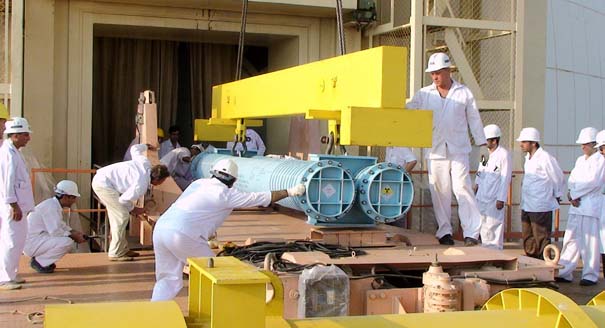Shahram Chubin
{
"authors": [
"Shahram Chubin"
],
"type": "legacyinthemedia",
"centerAffiliationAll": "dc",
"centers": [
"Carnegie Endowment for International Peace",
"Malcolm H. Kerr Carnegie Middle East Center",
"Carnegie Europe"
],
"collections": [],
"englishNewsletterAll": "",
"nonEnglishNewsletterAll": "",
"primaryCenter": "Carnegie Endowment for International Peace",
"programAffiliation": "NPP",
"programs": [
"Nuclear Policy"
],
"projects": [],
"regions": [
"Middle East",
"Iran",
"Gulf"
],
"topics": [
"Security",
"Foreign Policy",
"Nuclear Policy"
]
}
Source: Getty
The Bleak Prospects for Negotiations Between Iran, the EU and the P5+1
By focusing the new round of negotiations between Iran and the P5+1 on swapping nuclear materials in order to reduce Iran’s fissile stockpile, negotiators are engaging in stalling tactics rather than creating the foundation for a long-term solution.
Source: Le Temps

First, there is no common agreement on what purpose negotiations serve; for the P5+1 it is to test Iranian flexibility on limiting its nuclear programme, in light of the technical difficulties it is experiencing and the tightening of sanctions since June 2010.
For Iran, it is a way of demonstrating that it does not reject diplomacy, though it is not willing to make substantive concessions to make discussions productive.
The basic problem, besides mutual mistrust, is that their approaches are incompatible. The P5+1 want to make progress in small steps (e.g. a fuel swap) to build confidence and reduce the underlying mistrust to tackle the harder issues.
Iran, in contrast, sees compromise as denoting weakness leading inexorably to catastrophe. It therefore wants to be sure of the entire game-plan, the end point, and the road map toward an eventual grand bargain, before committing itself to anything.
Further complicating matters, the two sides do not agree on their respective power positions; each is convinced the other is weakened and, if pressed, will make concessions.
Both sides are also politically constrained. Ahmadinejad differentiated himself from his predecessors by scorning their attempts to meet the West halfway and demonstrated Iran had nothing to fear from ‘strategic defiance.’ His domestic critics are in no mood to reward him now by supporting his attempt at overtures to the West, designed to strengthen his position at home. The Obama administration is also unable to loosen its position for fear of domestic criticism (especially after the midterm election setbacks) as well as the reluctance of interested foreign hardliners such as Israel.
In principle the outline of an essential agreement is clear enough: engagement plus criticism on human rights, terrorism, etc. and acceptance of Iran’s right to determine its own system and to (some level of) enrichment but with intrusive inspections.
A functional equivalent of the Arab-Israel “Clinton parameters” needs to be devised and publicized. Interested parties like Israel, Saudi Arabia, and Russia need to have their input (but not a veto).
No Iranian government is likely to accept the renunciation of the right to enrichment, though a temporary ‘voluntary’ freeze is conceivable, if couched in the broader terms noted earlier.
For the P5+1 anything short of a halt to all enrichment is unlikely to create the necessary confidence in Iran’s intentions.
Any interim agreement on a swap of nuclear materials (which the current round focuses on), however desirable, will not deal with the underlying issue. If successful, by reducing Iran’s fissile stockpile it will be buying time. This will give space for diplomacy. But after eight years it is not time that has been lacking but the “will” of the two parties to settle matters peacefully.
Some long-range thinking has to replace the tactical approaches which are politically convenient for the US administration. No administration wants to have to choose between an Iranian bomb and bombing Iran. But faith in sanctions and internet attacks to stop/reverse the nuclear programme appear feckless in the extreme.
Iran’s continued recalcitrance is not an excuse. The US should devise and prepare a plausible diplomatic solution which it can sell domestically and its allies can live with. At worst, if rejected, it can then publicize the terms of its notional offer. Failure to prepare for a compromise solution suggests only a tepid interest in a peaceful settlement. Since there are domestic political risks whatever course is adopted, the suspicion must be that today’s policy of ‘running out the clock’ is the political path of least resistance. Later on, somebody else will have to take care of it. For an administration beleaguered by multiple crises, that must be tempting.
About the Author
Former Nonresident Senior Fellow, Nuclear Policy Program
Chubin, who is based in Geneva, focuses his research on nonproliferation, terrorism, and Middle East security issues. He was director of studies at the Geneva Centre for Security Policy, Switzerland, from 1996 to 2009.
- Iran and the P5+1 in Moscow: Time is Running Out (Again)In The Media
- The Revolution in Cairo is a Serious Warning for the MullahsIn The Media
Shahram Chubin
Recent Work
Carnegie does not take institutional positions on public policy issues; the views represented herein are those of the author(s) and do not necessarily reflect the views of Carnegie, its staff, or its trustees.
More Work from Carnegie Endowment for International Peace
- Iran Is Pushing Its Neighbors Toward the United StatesCommentary
Tehran’s attacks are reshaping the security situation in the Middle East—and forcing the region’s clock to tick backward once again.
Amr Hamzawy
- The Gulf Monarchies Are Caught Between Iran’s Desperation and the U.S.’s RecklessnessCommentary
Only collective security can protect fragile economic models.
Andrew Leber
- Duqm at the Crossroads: Oman’s Strategic Port and Its Role in Vision 2040Commentary
In a volatile Middle East, the Omani port of Duqm offers stability, neutrality, and opportunity. Could this hidden port become the ultimate safe harbor for global trade?
Giorgio Cafiero, Samuel Ramani
- Europe on Iran: Gone with the WindCommentary
Europe’s reaction to the war in Iran has been disunited and meek, a far cry from its previously leading role in diplomacy with Tehran. To avoid being condemned to the sidelines while escalation continues, Brussels needs to stand up for international law.
Pierre Vimont
- What We Know About Drone Use in the Iran WarCommentary
Two experts discuss how drone technology is shaping yet another conflict and what the United States can learn from Ukraine.
Steve Feldstein, Dara Massicot









